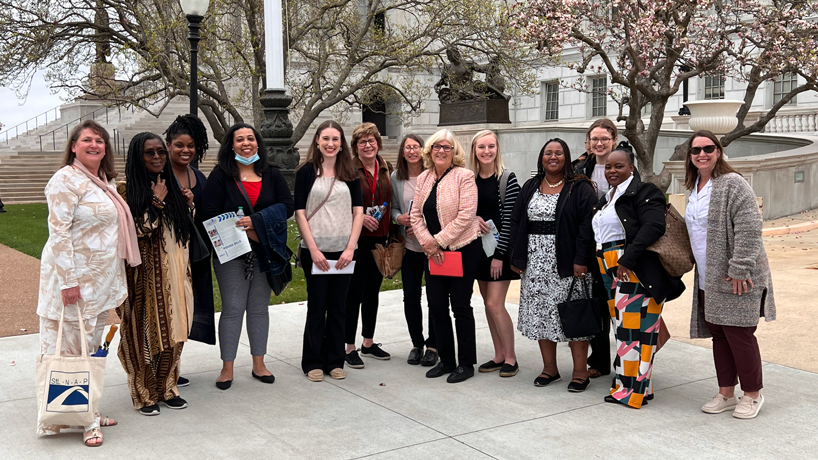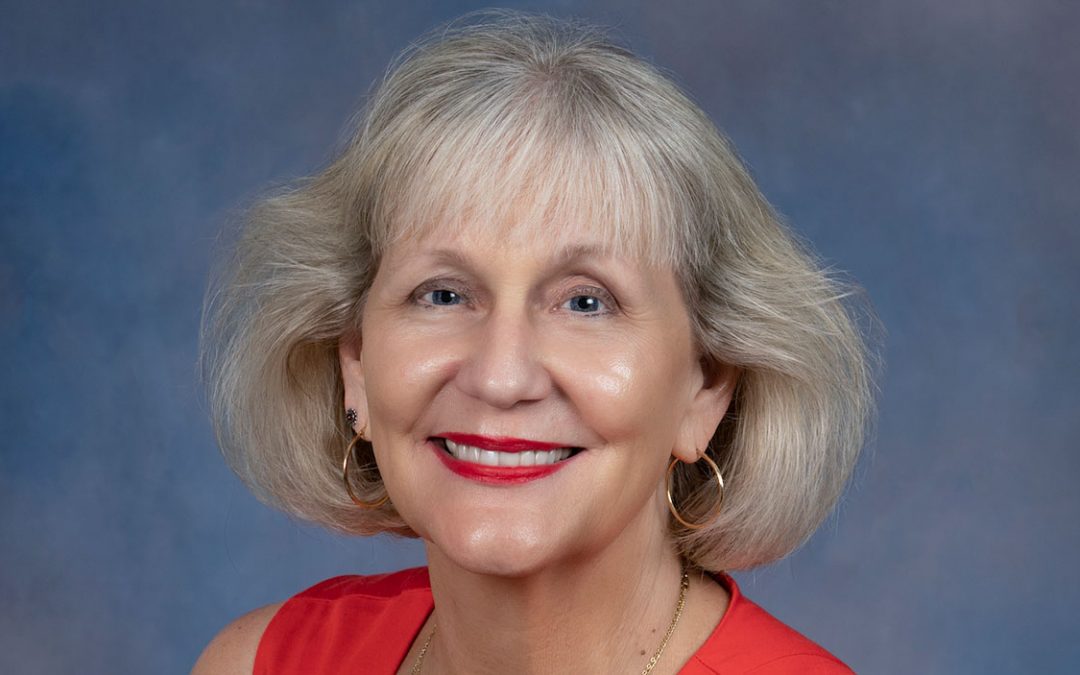
College of Nursing faculty members and students (from left) Laura Kuensting, Pam Talley, Marina Fischer, Marie Turner, Brooke Shahriary, Louise Miller, Kate Skrade, Carla Beckerle, Taylor Nealy, Ann Mwangi-Amann, Paige Bernau, Lucy Kokoi and Tammy Vandermolen visited the Missouri Capitol last Tuesday to take part in the Association of Missouri Nurse Practitioners Advocacy Day. (Photo courtesy of Laura Kuensting)
Missouri faces a shortage of primary care physicians, particularly in rural and underserved communities, making it challenging for residents in some parts of the state to access health care services.
Advanced Practice Registered Nurses can provide an alternative because they are trained to assess, diagnose, treat and prescribe for medical conditions in much the same way optometrists are trained to assess, diagnose, treat and prescribe for eye-related conditions.
But rules in Missouri restrict APRNs to practicing within 75 miles of their collaborating physician and require an initial one-month direct observation of practice between an APRN and an MD or DO and regular medical record reviews of the APRN from the MD or DO. What’s more, MDs and DOs cannot have collaborative practice with more than six full-time APRNs or physician’s assistants, and APRNs cannot conduct video visits or write for home health orders.
Fourteen graduate students in the University of Missouri–St. Louis College of Nursing joined faculty members Laura Kuensting, Carla Beckerle and Louise Miller and other nurses from around the state in pushing for a loosening of these restrictions during the Association of Missouri Nurse Practitioners Advocacy Day on Tuesday at the Missouri Capitol in Jefferson City, Missouri.
The students’ participation was part of an assignment for their course: “Healthcare Policy and Economics.”
“I think it is very important to hear from nurses on the frontline,” said Pamela Talley, an MSN-DNP student in the College of Nursing who practices at CHIPs Health and Wellness Center on North Grand Ave. in the city of St. Louis. “We see the issues daily. We became nurses to take care of people, in response to seeing people suffer. Nurses have an ethical responsibility to advocate on behalf of those underserved populations. I believe it is a social justice issue and we must advocate for access to health care for all people.”
The students and faculty spent Tuesday morning talking to legislatures such as Sen. Steven Roberts and Sen. Brian Williams about access to health care, including for Talley’s clientele at CHIPS, a nurse-founded, free medical care clinic where most providers are volunteers in what is considered a medical-provider shortage area.
“I’ve been practicing as a pediatric nurse practitioner for over 30 years, mostly in the emergency department,” Kuensting said. “Children are a vulnerable population, often without health insurance, leaving the emergency department as their only source of health care. Organizations such as CHIPs and other nurse-led clinics in medical provider shortage areas can facilitate health maintenance and avoid episodic care visits for individuals and their healthcare needs, but the barriers APRNs face in Missouri make providing care extremely difficult.”
Talley had the opportunity to describe how restrictions impact her ability to care for patients in her community.
“It was great meeting with state legislators to discuss the need to reduce practice restrictions,” Talley said. “These restrictions are a barrier to vulnerable populations in both rural and urban areas. The current collaborative agreement creates restrictions to fundamental access to health care for people to manage their health and to live a quality life.”
She added: “If nurse practitioners could have greater independence and a less restrictive practice they would be able to provide much needed care in those areas where there are the greatest needs.”
There is precedent. Missouri temporarily lifted these restrictions for nearly two years during the COVID-19 pandemic with no adverse events, though that temporary lift expired on Dec. 31.
More and more states have also taken to permanently grants APRNs full-practice authority. On April 10, New York became the 25th state to take such action, and the Veterans Administration issue full practice authority to APRNs, regardless of the state they practice in, about two years ago.
“This course, and particularly this experience, is important for our APRN students to understand why being aware of the issues affecting our practice matter,” Kuensting said, “and more importantly, how to advocate for change.”














